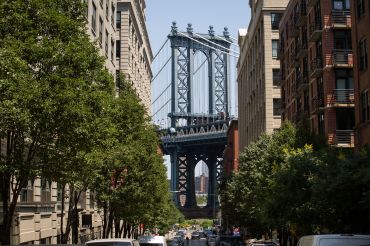Mayor Bill de Blasio met with a group of real estate professionals last week to discuss his agenda for New York City. He touched on many of the topics that he addressed during the campaign and in his many news conferences since being elected. Among these, the highlights were public safety, affordable housing and our public school system.
As you can imagine, his initiative to expand our base of affordable housing was met receptively by our group, particularly when the mayor said that he is in favor of greater zoning density in some districts. He did not discuss plans to require, rather than incentivize, affordable components in new developments, which would not have been met so receptively.
The mayor discussed the importance of public safety and safe streets. He applauded the job already done by Police Commissioner Bill Bratton and also reviewed his initiative to keep pedestrians safe by lowering speed limits and establishing a new set of rules for taxis. One of these changes for cabbies is to have meters installed that automatically shut off when the cab is going above the speed limit. I thought to myself, “Wow, a real incentive for these guys to play by the rules and do the right thing.” I thought to myself that the mayor must believe in creating incentives to motivate employees to do their best and play by a set of rules.
Mayor de Blasio also repeated his staunch commitment to universal prekindergarten and robust after-school programs for middle school students. He said that education is the key to the city’s future since the more educated our citizens are, the better they will do economically through a wider array of job opportunities. After all, technology is eliminating many routine jobs and replacing them with the need for thinking jobs. The mayor connected the dots between higher employment and better occupancy rates in our office towers, residential buildings and retail spaces.
These things sound positive. And it got me thinking about why our schools, both nationally and locally, are doing so poorly, particularly in light of how much we spend on educating our young people. The mayor said that only about one in five students who attend high school graduate fully prepared for college.
Nationally, we spend about $10,560 per student (as of fiscal year 2011, the most recent year for which this data is available). This figure is the fifth highest total in the world behind only Luxembourg, Austria, Norway and Switzerland. The Paris-based Organization for Economic Cooperation and Development, which does extensive research on education, ranks the U.S. 17th in reading, 21st in science and 26th in math. In contrast, the Slovak Republic only spends about $5,300 per student and performs at about the same level we do.
In New York City, according to the U.S. Census Bureau, we spent about $19,770 per student in 2011, the highest average out of the 100 largest school districts in the nation. This figure has skyrocketed from $11,000 in 2002. So I thought, with all the money we spend on education, why are the results so poor?
Then I thought back to the taxi drivers. They are being economically incentivized to play by the rules and do a good job. What about the engine of our school system, the teachers? Many of the people in the room with the mayor asked questions, so I didn’t have a chance to chime in. But if I did, my question would have been, “Mr. Mayor, if incentives to do a good job are O.K. for cab drivers, why wouldn’t you endorse some kind of incentives for teachers?”
Teachers, after a short period of time, get “tenure,” which makes it nearly impossible to fire them unless they practically commit a felony. The United Federation of Teachers also fights hard against any effort to standardize an evaluation system to determine how well teachers are performing. Could you imagine what things would be like in the private sector if employees rebuked being evaluated and couldn’t be fired? Businesses would run as poorly as the school system does, and it would show in their performance.
My father was a school teacher in the public school system, so I am sensitive to the difficulties of the profession. My only observation is that the only motivation they have to do a good job is out of the goodness of their hearts. Reforming the way the schools work would probably do a lot more good than pre-K and after-school programs (I do acknowledge the benefits of both of these).
Real reform could help immensely, but I have always been told that the financial support and endorsement of the UFT was too compelling to allow an elected official to earnestly reform. If the mayor really wants to make a difference in our school system, and the future of our city, it might be worth a try.


